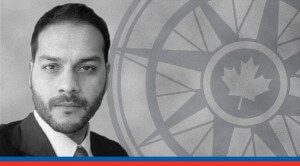 The brutal war in Aleppo progresses unabated but Canada continues to abdicate its leadership responsibility as carnage overtakes Syria, writes Shuvaloy Majumdar.
The brutal war in Aleppo progresses unabated but Canada continues to abdicate its leadership responsibility as carnage overtakes Syria, writes Shuvaloy Majumdar.
By Shuvaloy Majumdar, Dec. 6, 2016
A perilous challenge to world order looms in the carnage of Syria.
Starved for nearly a month from food or medicine, Aleppo has been under medieval siege, the constant bombardment making it the single worst place on earth. Desperate tweets deny the world the excuse of ignorance.
The prime minister must take a strong position on Syria. While Ottawa advocates for Syria at the UN General Assembly, the brutal war in Aleppo continues unabated. Bashar Al Assad and his partners in Iran and Russia are flaying the Syrian people, and Canada’s silence is stunning.
The assault on Aleppo is intensifying under the Russo-Iranian axis. Tens of thousands of hardened Hezbollah and Iranian Revolutionary Guard Corps (IRGC) fighters flank Syrian forces. Hundreds of sorties of Russian bombers bludgeon rebel enclaves, dropping bunker bombs crushing underground hospitals. Syrian helicopters drop chlorine gas, creating an unbearable, suffocating hell. We should keep the actions of Assad’s enablers at the forefront as Canada considers normalizing relations with Iran and Russia.
Starved for nearly a month from food or medicine, Aleppo has been under medieval siege, the constant bombardment making it the single worst place on earth
Recent rapprochement between Vladimir Putin and Tayyip Recep Erdogan has prevented NATO from agreeing on who the enemy is, while Russia, Iran and Turkey pour over maps to carve out their spheres of influence. Fruitless debates at the United Nations have failed under the knife of the Russian veto. Negotiations with Moscow have been a shell game coaxing the world into never-ending dialogue, diffusing its capacity to act. A lame duck U.S. administration quietly confesses that more could have been done years ago to limit the war.
In this vacuum of power, the world’s most belligerent actors are dancing on the bones of the dead and, in their bloodlust for hegemony, laughing at an international system they have turned on its head.
Russia and Iran have seized the momentum, and they must be stopped.
The challenge for Canadian foreign policy is to mitigate the risks of the rebels faltering in Aleppo, with the more long-term strategic challenge of Russia and Iran’s vicious play for power. Should Aleppo fall, an even more dystopian region will emerge.
The prime minister must take a strong position on Syria.
Hezbollah and IRGC troops will span both Southern Lebanon and Western Syria, with a bigger base of sustained operations. Emboldened, Iran has established a geographic corridor of influence that goes to the doorstep of the one country the clerical regime is determined to disrupt and destroy: Israel.
The sectarian nature of Assad’s allies on the ground will only radicalize elements of the Sunni majority population in Syria and beyond. This has always been the plan: Decimate moderate Free Syrian Army rebels. Target Sunnis with harsh security measures, legitimizing the Jihadi narrative. Then watch, as they by desperation or by force, are recruited and radicalized by terrorists. Al Assad understood how to use this formula for his own legitimacy all along. At the onset of protests in Damascus, he unleashed Al Qaeda planners from Syrian prisons, cynically styling himself as the champion of pluralist stability against a terror network he helped spawn.
Russia would entrench as a major power, brimming with a fleet of aircraft, a highly sophisticated anti-aircraft system (of no use against ISIS), a naval base at Tartus central to its Mediterranean identity, and successful operational partnerships in Tehran, Baghdad, Damascus and Ankara. By the American inauguration, Vladimir Putin will be in a strong position to offer Washington a deal: to coordinate with the US to crush ISIS on Moscow’s terms.
This trajectory of the Syrian war has immense consequences for Canada, to our allies, and to those who share our values.
The European crisis continues, first with Brexit and most recently the Italian referendum. Erdogan has threatened to further destabilize Europe. With his command, a floodgate of migrants could once again wash across Europe from Turkey. Combined with profound anxiety, local demagogues, Kremlin propaganda and European benefactors from Russian companies, they pose a substantial challenge to Chancellor Angela Merkel’s re-election.
This trajectory of the Syrian war has immense consequences for Canada, to our allies, and to those who share our values. It is easy to be overwhelmed by the scale of the challenge, yet it is in these times when real leadership must emerge to end the Syrian war.
This is what Canada can do, if the leadership is truly determined to shape the course of history, rather than be shaped by it:
- Advance the significant position to call for grounding the Syrian Air Force, establishing no-fly zones and humanitarian corridors inside Syria, where critical safe havens must be created for Syrian civilians, and humanitarian agencies can supply essential services;
- Decide to undermine and dismantle the Russo-Iranian axis backing terror, genocide and dictatorship in Syria and Iraq, then start doing it as a matter of foreign policy at the United Nations, multilateral and regional fora;
- Update Canadian policy in Syria to confront both ISIS and Hezbollah/IRGC, ending the perception of preferring one sectarian terrorist over the other;
- Actively train and support subnational groups that demonstrably share pluralist values, including ethnic and religious minorities, and vetted local chapters of the Free Syrian Army;
- Stem the financial flows to terrorist actors inside Syria by imposing targeted sanctions against a list of specific foreign individuals and organizations known to sponsor terrorism in Syria, updating Canada’s Special Economic Measures Act (SEMA), and resourcing the Financial Action Task Force (FATF) to strengthen global compliance;
- Work with allies to conduct humanitarian air drops in besieged and inaccessible areas, and insist on a transparent humanitarian framework to assure critical access for those that need it most, ending the Assad regime’s exploitation of aid for its own political benefit; and,
- Engage what’s left of Syrian civil society to preserve the institutions that will be needed in the aftermath of the war to shape an enduring, stable, federal Syrian society after this regime.
We risk sleepwalking into a region that will challenge Canadian values and interests more deeply than at any other moment in recent memory. There are limits to Canadian power. Yet real leadership can advance these positions morally and strategically by engaging our allies and taking the challenge to end the Syria war seriously.





